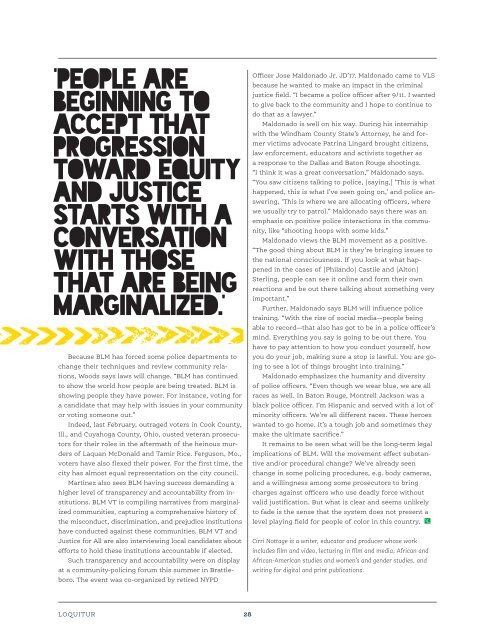In search of justice
fall2016_web
fall2016_web
Create successful ePaper yourself
Turn your PDF publications into a flip-book with our unique Google optimized e-Paper software.
'People are<br />
beginning to<br />
accept that<br />
progression<br />
toward equity<br />
and <strong>justice</strong><br />
starts with a<br />
conversation<br />
with those<br />
that are being<br />
marginalized.'<br />
Because BLM has forced some police departments to<br />
change their techniques and review community relations,<br />
Woods says laws will change. “BLM has continued<br />
to show the world how people are being treated. BLM is<br />
showing people they have power. For instance, voting for<br />
a candidate that may help with issues in your community<br />
or voting someone out.”<br />
<strong>In</strong>deed, last February, outraged voters in Cook County,<br />
Ill., and Cuyahoga County, Ohio, ousted veteran prosecutors<br />
for their roles in the aftermath <strong>of</strong> the heinous murders<br />
<strong>of</strong> Laquan McDonald and Tamir Rice. Ferguson, Mo.,<br />
voters have also flexed their power. For the first time, the<br />
city has almost equal representation on the city council.<br />
Martinez also sees BLM having success demanding a<br />
higher level <strong>of</strong> transparency and accountability from institutions.<br />
BLM VT is compiling narratives from marginalized<br />
communities, capturing a comprehensive history <strong>of</strong><br />
the misconduct, discrimination, and prejudice institutions<br />
have conducted against these communities. BLM VT and<br />
Justice for All are also interviewing local candidates about<br />
efforts to hold these institutions accountable if elected.<br />
Such transparency and accountability were on display<br />
at a community-policing forum this summer in Brattleboro.<br />
The event was co-organized by retired NYPD<br />
Officer Jose Maldonado Jr. JD’17. Maldonado came to VLS<br />
because he wanted to make an impact in the criminal<br />
<strong>justice</strong> field. “I became a police <strong>of</strong>ficer after 9/11. I wanted<br />
to give back to the community and I hope to continue to<br />
do that as a lawyer.”<br />
Maldonado is well on his way. During his internship<br />
with the Windham County State’s Attorney, he and former<br />
victims advocate Patrina Lingard brought citizens,<br />
law enforcement, educators and activists together as<br />
a response to the Dallas and Baton Rouge shootings.<br />
“I think it was a great conversation,” Maldonado says.<br />
“You saw citizens talking to police, [saying,] ‘This is what<br />
happened, this is what I’ve seen going on,’ and police answering,<br />
‘This is where we are allocating <strong>of</strong>ficers, where<br />
we usually try to patrol.” Maldonado says there was an<br />
emphasis on positive police interactions in the community,<br />
like “shooting hoops with some kids.”<br />
Maldonado views the BLM movement as a positive.<br />
“The good thing about BLM is they’re bringing issues to<br />
the national consciousness. If you look at what happened<br />
in the cases <strong>of</strong> [Philando] Castile and [Alton]<br />
Sterling, people can see it online and form their own<br />
reactions and be out there talking about something very<br />
important.”<br />
Further, Maldonado says BLM will influence police<br />
training. “With the rise <strong>of</strong> social media—people being<br />
able to record—that also has got to be in a police <strong>of</strong>ficer’s<br />
mind. Everything you say is going to be out there. You<br />
have to pay attention to how you conduct yourself, how<br />
you do your job, making sure a stop is lawful. You are going<br />
to see a lot <strong>of</strong> things brought into training.”<br />
Maldonado emphasizes the humanity and diversity<br />
<strong>of</strong> police <strong>of</strong>ficers. “Even though we wear blue, we are all<br />
races as well. <strong>In</strong> Baton Rouge, Montrell Jackson was a<br />
black police <strong>of</strong>ficer. I’m Hispanic and served with a lot <strong>of</strong><br />
minority <strong>of</strong>ficers. We’re all different races. These heroes<br />
wanted to go home. It’s a tough job and sometimes they<br />
make the ultimate sacrifice.”<br />
It remains to be seen what will be the long-term legal<br />
implications <strong>of</strong> BLM. Will the movement effect substantive<br />
and/or procedural change? We’ve already seen<br />
change in some policing procedures, e.g. body cameras,<br />
and a willingness among some prosecutors to bring<br />
charges against <strong>of</strong>ficers who use deadly force without<br />
valid justification. But what is clear and seems unlikely<br />
to fade is the sense that the system does not present a<br />
level playing field for people <strong>of</strong> color in this country.<br />
Cirri Nottage is a writer, educator and producer whose work<br />
includes film and video, lecturing in film and media, African and<br />
African-American studies and women’s and gender studies, and<br />
writing for digital and print publications.<br />
LOQUITUR 28


